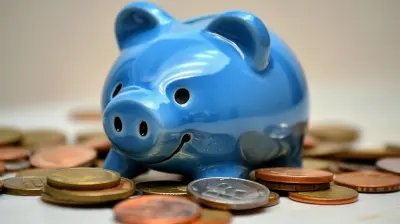14 March 2025
Let’s be real. Saving money isn't exactly the most exciting activity in the world. You’re basically saying, “Hey, let me not spend this money now so Future Me can be less stressed.” Future You will thank you, sure, but Present You is staring at that money thinking, I could totally buy a new gadget, book a spontaneous trip, or finally upgrade my coffee machine.
But here’s the deal—an emergency fund is one of the smartest financial moves you can make. Life loves throwing unexpected expenses at us like it’s in some sort of financial dodgeball game. The car breaks down, medical bills appear out of nowhere, your laptop decides it’s had enough of existence—all these things cost money. And if you don’t have an emergency fund, guess where the money comes from? Yep, your credit card (and future stress).
So, how do you stay motivated when the temptation to dip into that emergency stash is strong? Let’s break it down.

1. Set a Clear (and Fun) Goal
Saying, “I want an emergency fund,” is great, but it’s also kind of vague. Instead, make it specific. How much do you need? Why do you need it?For example:
- I want to save $5,000 so I can cover three months of expenses if I lose my job.
- I need a $2,000 cushion so unexpected car repairs don’t send me into a spiral of panic.
And if numbers alone aren’t enough to keep you going, try gamifying it! Compete with yourself—can you save faster this month than last? Or visualize it—every $100 saved gets you one step further up an imaginary ladder toward financial freedom.

2. Name Your Emergency Fund
Okay, hear me out. Naming things makes them feel personal and meaningful. Don’t just call it “Emergency Fund.” That’s boring. Call it something fun, like:- “Oh No Money” (because it saves you when life says “Oh no!”)
- “Freakout Fund” (because it prevents financial freakouts)
- “The Buffer Zone” (because it keeps you from falling into debt disaster)
Every time you transfer money into it, you’ll smile instead of sighing.

3. Automate Your Savings
Let’s be honest, if saving requires too much effort, you’re going to find an excuse to put it off. That’s just human nature.Solution? Automation! Schedule a small amount to go directly into your emergency fund every payday. If the money never touches your checking account, you won’t be tempted to spend it. Even $25 every two weeks adds up faster than you think!

4. Reward Yourself for Milestones
Saving money can feel like a slow burn, so why not celebrate the wins? Each time you hit a milestone—say every $500 saved—treat yourself to something small and guilt-free.- Hit $500? Buy that fancy coffee you usually avoid.
- Reach $1,000? Have a movie night with extra popcorn.
- Get to $3,000? A cheap-but-fun day trip might be in order.
The key is to keep the rewards small enough that they don’t derail your savings but still make the process enjoyable.
5. Avoid Lifestyle Inflation
Ever notice how when your paycheck goes up, your spending magically increases too? That’s lifestyle inflation, and it can wreck your savings plan.Instead of letting every raise or bonus go straight into “treat yourself” mode, pretend it never happened—at least partially. If you get a raise, increase your automatic savings. If you get a bonus, send a chunk of it to your emergency fund before you spend a dime.
Future You will be super proud.
6. Make It a Challenge
A little competition never hurt anyone! Challenge yourself (or a friend) to save a certain amount within a set timeframe.Some fun challenges include:
- The $5 Bill Challenge: Every time you get a $5 bill, put it in savings.
- The 52-Week Challenge: Save $1 the first week, $2 the second week, and so on. By the end, you’ll have $1,378!
- No-Spend Weekends: Pick one weekend a month where you don’t spend a single extra dollar.
Turning savings into a game makes it way less painful.
7. Picture the Alternative (a.k.a. Scare Yourself a Little)
Imagine this: Your car breaks down, repair bills come in, and you have zero savings. Now you’re stuck putting everything on a credit card at 25% interest.Sounds stressful, right? Visualization is powerful. Reminding yourself of how ugly financial emergencies can get without savings might be just the motivation you need to keep pushing forward.
8. Keep Your Savings Out of Sight (But Not Too Far)
If you keep your emergency fund in your everyday checking account, you’ll be tempted to dip into it for things that aren’t actual emergencies (impulse buys, I’m looking at you).Consider keeping your emergency fund in a separate high-yield savings account. Out of sight, out of mind—until you really need it. Just make sure it’s still accessible enough in an emergency. You don’t want to be jumping through hoops when you need that cash ASAP.
9. Track Your Progress (Visually!)
There’s something satisfying about watching your savings grow. Whether it’s a spreadsheet, a budgeting app, or an old-school chart on your fridge, having a visual representation of your progress can keep you motivated.Some people even draw a thermometer-style chart and color it in as they save more—because who doesn’t love a good coloring session?
10. Remember It’s Okay to Start Small
Saving money can feel overwhelming, especially if you're starting from zero. But remember—every little bit counts.Even if you can only save $5 a week right now, that’s better than nothing. The key is consistency. As your financial situation improves, you can gradually increase your contributions. The most important part is just getting started.
11. Remind Yourself Why You’re Doing It
At the end of the day, your emergency fund is there to protect you from stress, anxiety, and financial disasters. It’s your safety net, your cushion, your peace of mind.Whenever you feel unmotivated, think about the relief you’ll feel knowing you have a financial buffer. Future You will be so grateful you stayed the course.
Final Thoughts
Building an emergency fund isn’t the most glamorous financial goal, but it’s one of the smartest. By setting clear goals, automating your savings, rewarding yourself, and staying motivated with fun challenges, you’ll make the process way more enjoyable.Remember, this isn’t about depriving yourself—it’s about securing a stress-free future. And honestly? That’s worth way more than that impulse buy you’re eyeing right now.
Happy saving!








Thalor McRae
Great insights! Staying motivated during the emergency fund journey can be tough, but setting clear goals and tracking progress makes it rewarding. Consistency truly pays off in the end.
March 27, 2025 at 7:57 PM